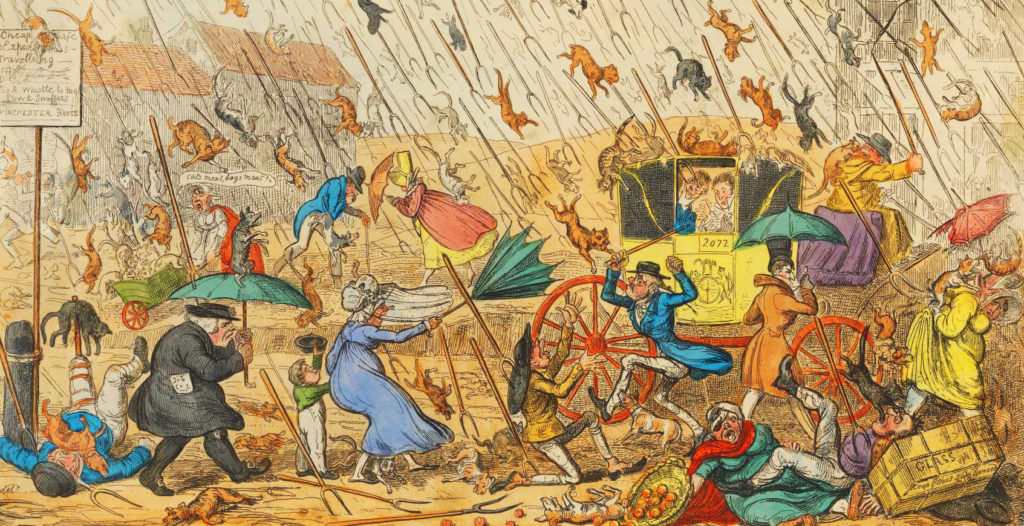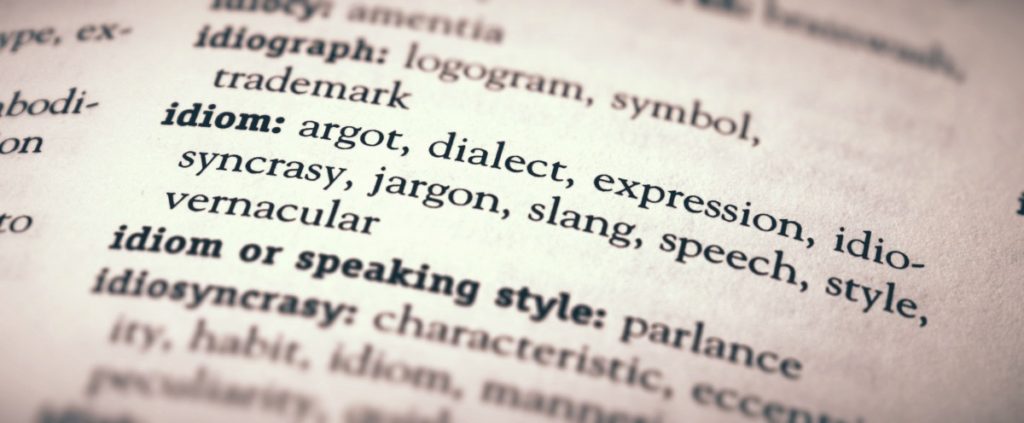
Language. It’s what makes writing and storytelling possible. It can be clear and coincise, vivid and evocative, or abstract with deep metaphors. Chances are that if you’ve done a bit of writing, are a book worm, or are into creating worlds though fiction, you’ve given a bit of thought to language.
How people express themselves tells a lot about the world around them. Not just the words they use, but how they use them. When people (either real or imaginary) talk to each-other, they speak in more than just words. Similes, metaphors, hyperbole, slang, quotes, and various other forms of witty banter.
However, one type of “figurative language” you find in almost every conversation carries a special power. Let alone if you’re writing style is filled with evocative metaphors or similes; what occurs in a casual conversation may contain coded phrases that suggest one thing, but mean something completely different.
You might be familiar with the phrase “It’s raining cats and dogs!”.
When someone says this phrase, do you immediately look outside to check if Wonderdog and Princess Floofykins are free-falling from 10,000 feet in the air? … Or do you imagine that the precipitation is implying the downpour of an Olympic-sized swimming pool?
Chances are, it’s the second one! … But how did you know this? Was the phrase just too absurd to think it was the first, or is there something about it you’re familiar with in advance? Enter, the “idiom“.
An idiom is many things: a clever reference, a rite of passage, a phrase that betrays its own words, an open cipher shared between a wide world of peers! … Today, I want to target not just idioms, but how they appear in Fantasy and Science Fiction.
What is an Idiom?
“An idiom is a phrase or expression that has a meaning that in most cases cannot be deduced directly from the individual words in that phrase or expression.”
– From the website Lemongrad
Idioms are those little sayings provide flavor to dialogue.
When it rains cats and dogs, it’s a downpour. Holding your horses means to slow down or stop.
Are you cool as a cucumber? True that, cool cat! Don’t forget to keep a cool head, kick your heels, and save your breath. No need to cool your jets! They’re already chill!
Idioms are not just short-form slang, however.
They can also words of wit or wisdom with a subtle or hidden meaning, like a famous saying that’s quoted in the right context or situation. A smooth sea never made a skilled sailor. So batten down the hatches, my fair-weather friend!
Each of these examples came from their certain place and time.
It didn’t take a skilled sailor to know it wasn’t smooth seas that made them, but someone met a sailor that inspired their wit, and now the phrase is part of the English language. … All the same, language is your playground, and this is especially so when you are writing a story or building worlds.
If you close your eyes, and imagine a literary world of fantasy or sci-fi, do these same words of wit and wisdom live in that world? Or does this world have its own idioms?
Perhaps a bit of column A, a bit of column B?
When you use idioms in the right context, it has the power to aid the immersion of the reader into the scene. In speculative fiction, such as fantasy and science fiction, this might include some original ideas for how people in a certain setting or culture speak in a casual sense.

Idioms in Fantasy and Science Fiction
Books, movies, comics, and various other media have treated us to a wide array if idioms. Some of these idioms also count as slang, quotes, or common phrases.
Keep in mind that the point of an idiom is that its words alone dont depict their full meaning. The meaning is slightly hidden behind the words.
Some of my favorite idioms in fantasy:
- J.K. Rowlings “Harry Potter” Series
- The wizarding world is filled with colorful idioms!
- “The fire is lit, but the cauldron is empty”
- “I’ll eat my wand”
- “Its no good crying over spilled potion.”
- “Poisonous toadstools dont change their spots.”
- “To have a hairy heart.”
- “Wand of Elder, never prosper!”
- “Time is Galleons”
- “Son of a Bludger!”
- The wizarding world is filled with colorful idioms!
- George R.R. Martins “A Song of Ice and Fire” Series
- Phrases coined in their proper instances.
- “Winter is coming”
- “Now his watch has ended”
- “The night is dark and full of terrors”
- Some lesser known ones, with extra wit!
- “Words are wind!” – meaning talk is pointless
- “The crow calls the raven black” – meaning not to judge others
- Phrases coined in their proper instances.
- Brandon Sandersons “Mistborn” Series
- From the Mistborn Era 1 books
- “By the mist!”
- “Trying to lead us to a bad alloy.” – meaning to lead to a trap
- From the Mistborn Era 2 books
- “Rust and ruin!”
- From the Mistborn Era 1 books
- Joe Abercrombies “The First Law” Trilogy
- All three books are named after a shortened quote or reference, which technically makes them an idiom.
- “The Blade Itself incites to deeds of violence.”
- “We should forgive our enemies, but not Before They Are Hanged”
- “The Last Argument of Kings” – cast on the cannons of Louis XIV’s army.
- The words of Logan Nine-Fingers:
- “Back to the mud” – meaning ‘dead’
- “You’ve got to be realisitic about these things.”
- “Say one thing about Logan Ninefingers; day that he’s -insert adjective here-“
- All three books are named after a shortened quote or reference, which technically makes them an idiom.
Some of my favorite idioms in science fiction:
- George Lucas’s “Star Wars” Extended Universe
- Non-specific to any movie or show:
- “Run for their credits”
- “Wild bantha chase””
- “Too many admirals, not enough ensigns”
- “More than one way to skin a womp rat.”
- “Taking clams from a Gungan”
- Non-specific to any movie or show:
- Suzanne Collins “The Hunger Games”
- From either the books or the movies.
- “The girl on fire.” – referring to Katniss
- “May the odds be ever in your favor” – a sort of dishonest well-wishing
- “A plucked bird, ready for roasting”
- “Half a loaf is better than no bread”
- From either the books or the movies.
- Frank Herberts “Dune” Franchise
- Phrases coined in their proper instances.
- “Mu zein wallah!” – Nothing good!
- “Mektub al mellah.” – meaning “the thing was written with salt” – Freman proverb
- Phrases coined in their proper instances.
- Douglas Adams “Hitchhikers Guide to the Galaxy” Series
- Don’t Panic!
- “Fourty-two!”
- “Knowing where ones towel is.”
- Don’t Panic!
- Robert A. Heinlein’s “Starship Troopers”
- From either the book or the movie.
- “M.I. Does The Dying. Fleet Just Does The Flying”
- “Come On, You Apes, You Wanna Live Forever?”
- “To buy the farm”
- From either the book or the movie.
- Kurt Vonneguts Novels
- Idioms from Slaughterhouse Five
- “So it goes.”
- “Poo-tee-weet!”
- Idioms from Cats Cradle
- “See the cat? See the cradle?”
- Idioms from Slaughterhouse Five

How to Create Your Own Idioms
There is a lot that can be said about how a writer or world-builder can create idioms in their world. The first thing to know is that the idiom in question needs to be “natural” to the setting.
A highly effective idiom requires three things; … Reference, Imagery, and Hidden Meaning.
The first area, being reference, is a situation, object, or event that inspires the idiom. Something grounded in the world that the characters are quoting in.
In other words, when you look at how people live in your world, what challenges do they encounter? What does their day in and out look like? Are there any historical figures that are known for their quotes? Religions known for their wisdom or scripture? Industries that deal with the drudgery of a certain kind of work? Holidays of the year? Situations in war? Creatures common or mythical worth referencing?
Any of these things can give you subjects to create slang or metaphor from. Many idioms are also cleverly-quoted metaphors, or phrases that give imagery, while being subtle in their meaning.
Lets take a basic idiom from the Hunger Games: what if I want to speak a piece of wisdom in the moment: Maybe something with a food related reference, given the common theme of hunger and poverty?
Imagery is what gives the person hearing the idiom the ability to connect it to its meaning. A mental image. When a person says the idiom, or the narrator mentions it, that phrase needs to paint the picture to that the listener gets it. A visual that is nuanced, but suggestive enough to get the idea.
If I say “half a loaf is better than no bread”, it gives us the image of bread and its scarcity. It gives us an idea of the kind of “morals” taught in the setting, and the kind of struggle the people in that setting might be familiar with.
Most of all, it must have a hidden meaning. You need to determine what the message you want to get across is. The words themselves, taken literally, must be (at least slightly) different from its actual meaning.
Our idiom above, when taken literally, is… just a factual statement. Well no duh! Who wants no bread at all? Why say such an obvious thing!? … Yet, removing its word-for-word literal meaning, it indicates a broader idea. Not necessarily hidden, but nuanced in a way where, when applied to the moral of “taking what one can get”, makes a lot of sense in many a situation!
(The actual presence of bread: not required).
The best way to understand this is to first determine what dialogue it taking place, and who your characters are. What kind of influences do you imagine they would draw from? Are they of an occupation, profession, or class in society that speaks to that reference? What kind of emotion, idea, or imagery that the character is trying to depict in the dialogue?
Example Idioms found in one of my WIPs
If you haven’t noticed from bouncing around my site, I’m somewhat of an aspiring author myself. As of the writing of this article,
As the setting is one that takes place in a large and bustling city within an early-industrial fantasy world, many of its characters are prone to take to speech in a idiomatic way which defines the culture of the city, from its highest wards to its deepest alleys.
Here are some examples of idioms you might find spoken in this place:
“Punching above your weight”
To fend off against enemies stronger than you.
“Holy Daughter!”
A common exclamation, referencing the highest being in the pantheon, the goddess.
“Time to pick our lucky clover”
A common phrase in the local thieves cant, meaning a balanced team of four. Usually after making a plan for a burglary, infiltration, or other criminal act.
“Spell-beggar”
A derogatory term for a cleric, priest, paladin, or a magician that channels magic from a divine source. As opposed to arcane, which does not require appeasement, prayer, or channeling from a god.
“Its sacrilege to pull the mothers heart-strings.”
A term that describes arcane magic. Using such magic requires personally channeling from the “heart of the world”, which is often attributed in religion as the heart of the mother who governs the material world.
“Deep in the dirt of the world.”
To act or speak realistically, especially if the truth is brutal. Is sometimes shortened to “in the dirt”. If someone is telling an honest truth that someone doesn’t want to hear, they say… “I say this in the dirt.”
“Run the black board”
Similar to the act of someone taking up employment posted on a public bulletin, except the “black board” is code for work considered “criminal”. Running the black board means taking the lions share of work posted. Work that is…. less than legal.
“Look at you, set on thy oaken throne”
A phrase referencing an ancient poem widely known to the people in the world. The poem is a heroic epic, where the phrase is part of an accusation and denouncement of a tyrant king. Nowadays, when this phrase is said, its an idiom, used sarcastically when someone is acting overly selfish or regal.
“Wait a tick.”
A common way of saying “wait a moment” among tinkerers, crafts-people, and engineers.
“Sing them a lullaby”
In short, a phrase which means to knock someone out, often in a brawl or a street fight.
Resources for Idioms
Below are some useful links that helped me with some of my creations, and are sure to help you with some of your own idioms. That, or you can generate them just for fun!
- Fantasy Name Generators – Idiom Generator
- A random idiom generator. Usually best when you’re dry on ideas and you need material to work from.
- The Idioms – Largest Idioms Dictionary
- A terrific resource to search the English language for its most common idioms. This may help provide some ideas for your own work.
- The Ultimate RPG Character Backstory Guide
- A fantastic book by James D’Amato. Filled with prompts designed to help you flesh out a characters backstory, including an exercise on creating idioms.
Thank you for reading! Don’t miss the boat to check out some of these other fantastic articles on world-building and story writing. … And feel free to reach out to me directly. I’m an open book!
- Axolotls, Genies, and Kaiju; a Quick TTRPG Zine Roundup #2 - May 19, 2025
- d100 City Encounters and Urban Sidequests - April 26, 2025
- Dirtbags! a Sci-Fi Shooter RPG: Gameplay Review! - March 23, 2025


